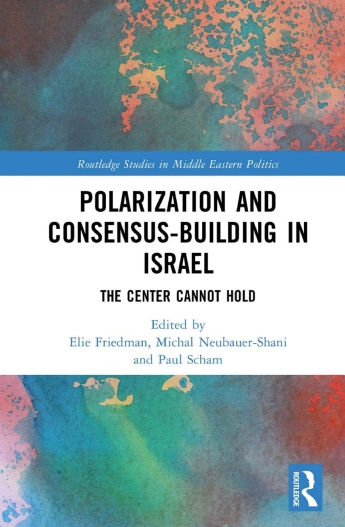Paul Scham

Associate Research Professor, Joseph and Rebecca Meyerhoff Program and Center for Jewish Studies
Associate Research Professor, Joseph and Alma Gildenhorn Institute for Israel Studies
pscham@umd.edu
1118B Taliaferro Hall
Get Directions
Paul Scham is Associate Research Professor of Israel Studies. He was the director of the Gildenhorn Institute for Israel Studies from 2020 until the end of June 2023, and prior to that was the Institute’s Executive Director from 2008. Originally an attorney, with a B.A. from Columbia and a J.D. from U.C. Berkeley, he quickly tired of practicing law and has worked on issues relating to Israel and the Israeli-Palestinian conflict for more than thirty years at NGO’s, think tanks, and universities, in Jerusalem and in Washington, D.C.
In the early 1990’s he worked in Washington with American and Israeli NGO’s to encourage Israeli-Palestinian contacts and dialogue. From 1996-2002, he lived in Jerusalem and, as a Research Fellow at the Truman Institute for the Advancement of Peace of the Hebrew University, coordinated its significant program of Arab-Israeli joint research, academic cooperation, and civil society projects. He also spent considerable time in Jordan and closely observed the failure of Jordanian “normalization” with Israel. During his time in Israel, he participated in dozens of civil society workshops, dialogues and conferences. In 2000, in cooperation with the European Union, he published one of the first survey analyses of Israeli/Arab academic cooperation after reviewing 195 ongoing Arab-Israeli academic projects.
He returned to Washington in 2002 and was a Visiting Scholar at George Washington University and subsequently an Adjunct Scholar at the Middle East Institute, with which he is still affiliated. During the next few years, he wrote numerous commentaries and other articles on aspects of the Israeli-Palestinian conflict and the peace process and frequently appeared on radio and television discussing the issue.
While in Israel, he began investigating the role of the very different historical narratives of Israelis and Palestinians on the continuation of their conflict. With an Israeli and a Palestinian colleague he organized a conference on this issue. This resulted in Shared Histories: A Palestinian-Israeli Dialogue, edited with Walid Salem, and Benjamin Pogrund, published in 2006. A second volume, examining some of the broad themes in the historical narratives of both sides, is entitled Shared Narratives, edited with Benjamin Pogrund and As’ad Ghanem, was published in 2013.
Professor Scham has also studied and written on Hamas, and in 2009 the U.S. Institute of Peace published a Special Report he co-authored with Osama Abu-Irshaid, entitled “Hamas: Ideological Rigidity and Political Flexibility.” His current research is in the political Right in Israel.
At the Gildenhorn Institute he has taught courses on the history of the Israeli-Palestinian conflict, a Federal Semester course on the making of American policy towards the conflict, and an Introduction to Modern Israel. Currently he teaches a large lecture course in the fall entitled Fundamental Questions of the Israeli-Palestinian Conflict (ISRL289i), which will be taught online in the fall of 2020. In the spring he teaches a seminar on The Right in Israel: A Historical Examination (ISRL349D, HIST328F). Like all university courses, it was conducted online this year after March.
Much of Professor Scham’s professional time was taken up with editing the Israel Studies Review, the flagship journal of the Association for Israel Studies, of which he served as co-editor with Prof. Yoram Peri. The journal appeared three times a year and had been ranked well into the highest quarter of academic journals. More details on the ranking are available here.
Publications
Polarization and Consensus in Israel: The Center Cannot Hold
"The Breakdown of Consensus in Israel" offers a multidisciplinary examination of the social and political fractures threatening Israel's cohesion.
Contributor(s): Paul Scham
This edited volume examines the most pressing social and political issues confronting Israel from a multidisciplinary perspective, focusing on the breakdown of social solidarity and the inability to formulate consensus.
The contributors – encompassing political scientists, historians, communication researchers, sociologists, economists, and educators – focus on specific topics that serve as exemplary cases of various trends of consensus and polarization. These trends are examined in the context of ideological, religious, economic, national, and ethnic cleavages. In addition, this volume analyzes how political actors’ preference for “non-decision” on various issues has resulted in the maintenance of a status quo, with cleavages or conflicts being neither mitigated nor polarized. Together, this collection of articles paints a picture of Israel as a state racked by increasing polarization along ideological and religious lines. It is argued that this difficulty in determining a consensual definition of the state threatens to destroy social solidarity in Israel altogether, a climate in which “the center cannot hold.”
This book is essential reading for anyone seeking to understand the major internal threats to Israel’s self-definition as a Jewish-democratic state and will also appeal to sociologists and political scientists interested in global polarization trends.
Read More about Polarization and Consensus in Israel: The Center Cannot Hold


